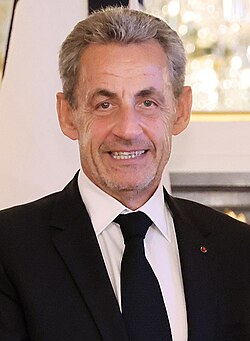OPINION
Nicolas Sarkozy And The Nigerian Reality

By Valentine Obienyem-
I encountered a post on the Facebook page of my friend, Chijioke Precious, SAN. It was not merely informative, but an invitation to reflection – that nobler function of thought through which truth slowly reveals itself. Allow me, then, to share it and ponder its hidden message.
First, let us summarise the learned SAN’s post: Following threats from fellow inmates, two police officers have been stationed beside former French President Nicolas Sarkozy’s cell at Paris’s La Santé prison.
The 70-year-old, serving a five-year sentence for accepting illegal campaign funds from Libya, described his first night as ‘frightening,’ prompting an immediate investigation and heightened security.
Beneath these seemingly cold facts lies the warmth of a mature civilization: a society that has learned to hold even its leaders accountable to the same laws that bind the ordinary citizen. France, like other advanced nations, has built a moral framework where no one, however powerful, is above the law.
Historically, France has indeed endured many political upheavals. From the rise and fall of Napoleon Bonaparte to the restoration of the Bourbons, and from the extravagance of its queens to the revolutionary fervor they helped ignite, France has weathered storms that ultimately shaped its modern conscience.
Across the world, similar stories resonate. In South Korea, two former presidents – Park Geun-hye and Lee Myung-bak – were imprisoned for corruption and abuse of power. In Israel, Ehud Olmert, once the nation’s head of government, traded the corridors of power for a prison cell.
Brazil’s Luiz Inácio Lula da Silva was condemned for corruption before destiny, and the people, restored him to power. In China, the once all-powerful Zhou Yongkang was brought low by the very state he had once ruled. In South Africa, Jacob Zuma, a hero of the anti-apartheid struggle, was not spared when he transgressed the law.
These examples illustrate a fundamental moral symmetry – suggesting that true civilization begins not with buildings or machines, but with the subordination of power to principle. It is sustained when leaders understand that they are not above their countries.
Now let us turn our gaze homeward. In Nigeria, these same crimes flourish like weeds in the rainy season, yet the agents of justice remain blind. Our prisons overflow with the poor, while the wealthy feast like Lucullus at the banquet of impunity.
Who was Lucullus? A Roman general of courage and success, who, after years of war, exchanged the rigors of the camp for the pleasures of luxury. His feasts were so lavish that his name – Lucullan – became synonymous with extravagance. When Cicero once teased him about his indulgence, Lucullus replied proudly, “Today, Lucullus dines with Lucullus.”
So too in Nigeria: our public officials, having plundered the commonwealth, retreat into a Lucullan existence – richly enjoying the spoils of their own corruption. Of course, they perceive themselves to be above the laws of the land.
Ours is a country that often adores even its worst leaders. Agencies created to combat corruption often become instruments of vengeance or bargaining chips in political maneuvering. Justice in Nigeria moves with lightning speed against the vulnerable, but crawls like a weary pilgrim when the accused wears the mantle of privilege.
The ancient Scythian sage, Anacharsis, once observed that “laws are like spiders’ webs; they catch the small flies, but let the big ones break through.” The passage of centuries has not diminished the wisdom of that saying.
In Nigeria, our legal system appears impressive on paper, but its beauty is deceptive. It ensnares the petty thief and the market vendor, but the grand looter, swollen with public wealth, tears through it with ease – even grace.
The tragedy is not merely legal; it is deeply moral. Every time a hungry youth is imprisoned for stealing a loaf of bread while a politician accused of stealing billions walks free, we broadcast to the world that our nation condones theft when it is grand, and punishes it only when it is petty.
Walk through Abuja, or any of our major cities. Behold our monuments, our streets, our airports – most of them bear the names of individuals whose deeds were a blight upon the nation’s conscience. We celebrate them simply because they once wielded power, not because they used it justly.
What irony! Some of those whose names adorn our landmarks seized power through coups, abrogated constitutions, and ruled by decree. They silenced dissent, squandered national wealth, and corrupted our moral foundations.
In a just world, such names would inspire somber reflection, not veneration. Yet we immortalise them in marble and concrete – as if to taunt Nigerians.
This perversion of values teaches our youth a dangerous lesson: that to be remembered in Nigeria, one must first have betrayed her. Our honors, our institutions, our monuments stand as testaments to usurpation.
In France, a former president sits behind bars – a clear message that power does not absolve wrongdoing. In Nigeria, those who have plundered the nation are serenaded in songs, celebrated in ceremonies, and enshrined in stone.
Perhaps one day, when our collective conscience awakens, we shall build a society where even the powerful fear the law; where power is subordinate to justice; and where lost honor cannot be redeemed with monuments.
Until then, Sarkozy sits in prison – and Nigeria, still deprived of justice, remains in chains.
-
CRIME4 years ago
PSC Dismisses DCP Abba Kyari, To Be Prosecuted Over Alleged $1.1m Fraud
-
FEATURED4 years ago
2022 Will Brighten Possibility Of Osinbajo Presidency, Says TPP
-
FEATURED2 years ago
Buhari’s Ministers, CEOs Should Be Held Accountable Along With Emefiele, Says Timi Frank
-
BUSINESS & ECONOMY2 years ago
Oyedemi Reigns As 2023’s Real Estate Humanitarian Of The Year
-
SPORTS2 years ago
BREAKING: Jürgen Klopp Quits Liverpool As Manager At End Of Season
-
SPORTS2 years ago
Could Liverpool Afford Kylian Mbappe For €200 million? Wages, Transfer Fee
-
ENTERTAINMENT2 years ago
Veteran Nigerian Musician, Basil Akalonu Dies At 72
-
FEATURED2 years ago
Tribunal Judgement: Peter Obi Warns Of Vanishing Electoral Jurisprudence, Heads To Supreme Court
-
BUSINESS & ECONOMY2 years ago
Oyedemi Bags ‘Next Bulls Award’ As BusinessDay Celebrates Top 25 CEOs/ Business Leaders
-
FEATURED4 years ago
2023 Presidency: South East PDP Aspirants Unite, Demand Party Ticket For Zone



































